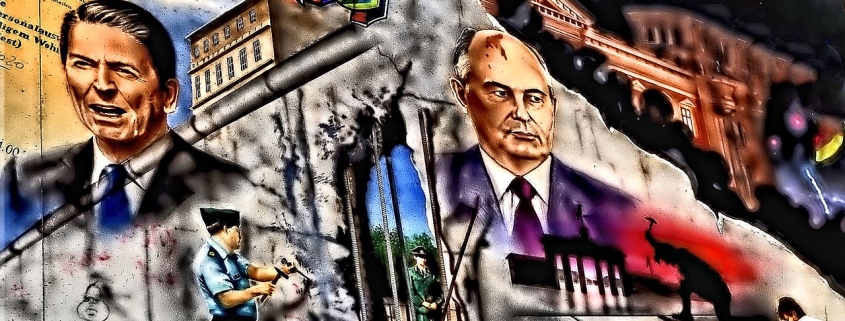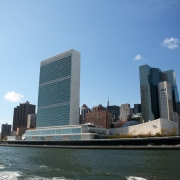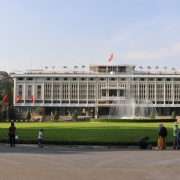How did Ronald Reagan end the Cold War?
Topic of Study [For H2 and H1 History Students]:
Paper 1: Understanding the Cold War (1945-1991)
Section A: Source-based Case Study
Theme I Chapter 3: End of Bipolarity
The end of the Cold War: Revisited
In one of our earlier articles, we have discussed the major incidents that led to the eventual end of the ideological division that transformed the world in the 20th century. Today, we will focus our attention on one of the key players that contributed to this pivotal moment in history.
About Ronald Reagan: A Hollywood Star; A World Leader
Before Reagan took office in January 1981, he was a well-known actor in the 1940s and 1950s. His accumulated experienced had paid off when he switched to politics. American voters were charmed by Reagan’s charisma and oratorical skills, such that he was nicknamed “The Great Communicator”.
The “Second Cold War”: The Arms Race
Following his electoral victory, Reagan assumed a position that differed drastically from his predecessor, Jimmy Carter, who pursued arms control, as exemplified by the Strategic Arms Limitation Talks (SALT I & II).
Instead, Reagan was supportive of military build-up. His rationale stemmed from the belief that American military superiority was vital in pressuring the Soviets to relent in the Cold War. Therefore, the Reagan administration oversaw a $180 billion five-year programme.
In November 1983, the Pershing II ballistic missiles were deployed in Western Europe. Additionally, the North Atlantic Treaty Organization (NATO) led command post exercise, code-named “Able Archer“, that simulated a coordinated nuclear attack.
Most importantly, the Strategic Defense Initiative (SDI) was announced publicly as a high-tech project that involved the use of “lasers” to target Soviet ballistic missiles in space. Despite the absurd-sounding concept, the Soviets took the announcement seriously.
Later, the incoming Soviet leader Mikhail Gorbachev met Reagan over a series of summits that culminated in the end of the arms race. Notably, the “Washington Summit” ended with the successful signing of the Intermediate-Range Nuclear Forces (INF) Treaty by Reagan and Gorbachev.
Each Party shall eliminate all its intermediate-range missiles and launchers of such missiles, and all support structures and support equipment of the categories listed in the Memorandum of Understanding associated with such missiles and launchers, so that no later than three years after entry into force of this Treaty and thereafter no such missiles, launchers, support structures or support equipment shall be possessed by either Party.
Intermediate-Range Nuclear Forces (INF) Treaty, 8 December 1987.
The Reagan Doctrine: Renewed Containment
Similar to the first US President, Harry Truman, who outlined his policy of ‘containment’, Reagan introduced a doctrine to intensify American efforts in countering the Soviet influence in the Third World.
The “Reagan Doctrine” shaped the US administration’s foreign policy, in which covert aid was given to counter-revolutionaries that fought against the Soviets Africa, Asia and Latin America.
We cannot play innocents abroad in a world that’s not innocent; nor can we be passive when freedom is under siege. Without resources, diplomacy cannot succeed… And I hope that you in the Congress will understand that, dollar for dollar, security assistance contributes as much to global security as our own defense budget.
From Ronald Reagan’s State of the Union Address, 6 February 1985
We must stand by all our democratic allies. And we must not break faith with those who are risking their lives—on every continent, from Afghanistan to Nicaragua—to defy Soviet-supported aggression and secure rights which have been ours from birth.
Subsequently, the US expanded its scope of support in the above-mentioned regions. For example, the Soviet-Afghan War saw a turning point in September 1986. During “Operation Cycle”, the US provided “Stinger” missiles that were effective against Soviet aircraft. Eventually, the war ended in February 1989.
A lasting legacy
Before Reagan ended his second term as the US President, he made an address to the nation, reflecting on his past contributions and how the Cold War had changed the world.
Nothing is less free than pure communism — and yet we have, the past few years, forged a satisfying new closeness with the Soviet Union. I’ve been asked if this isn’t a gamble, and my answer is no because we’re basing our actions not on words but deeds. The detente of the 1970’s was based not on actions but promises. They’d promise to treat their own people and the people of the world better. But the gulag was still the gulag, and the state was still expansionist, and they still waged proxy wars in Africa, Asia, and Latin America.
Well, this time, so far, it’s different. President Gorbachev has brought about some internal democratic reforms and begun the withdrawal from Afghanistan.
“Farewell Address to the Nation”, by Ronald Reagan, 11 January 1989
Evidently, the mutual cooperation with the Soviet leader Gorbachev had paid off as it led to the end of the Cold War.
What can we learn from this article?
Consider the following question:
– How far do you agree that Reagan was largely responsible for the end of the Cold War? [to be discussed in class].
Now that you have covered the main contributions of Ronald Reagan in understanding the end of Bipolarity, it is important that you attempt related source based case study questions to review your knowledge comprehension. Join our JC History Tuition and receive organised materials to raise the productivity of your revision. We also provide skills development workshops to teach JC students how to do source comparision and analysis.
The H2 and H1 History Tuition feature online discussion and writing practices to enhance your knowledge application skills. Get useful study notes and clarify your doubts on the subject with the tutor. You can also follow our Telegram Channel to get useful updates.
We have other JC tuition classes, such as JC Math Tuition and JC Chemistry Tuition. For Secondary Tuition, we provide Secondary English Tuition, Secondary Math tuition, Secondary Chemistry Tuition, Social Studies Tuition, Geography, History Tuition and Secondary Economics Tuition. For Primary Tuition, we have Primary English, Math and Science Tuition. Call 9658 5789 to find out more.











